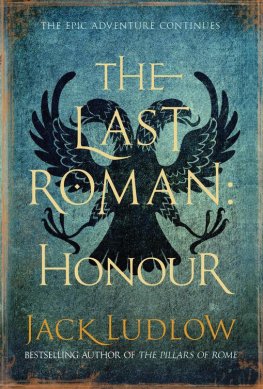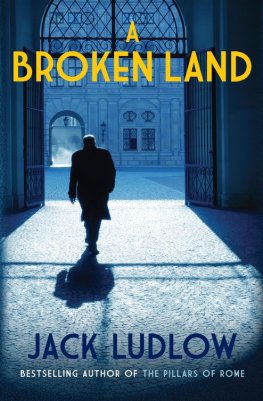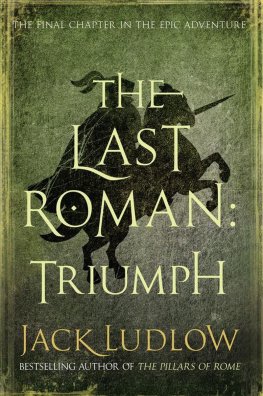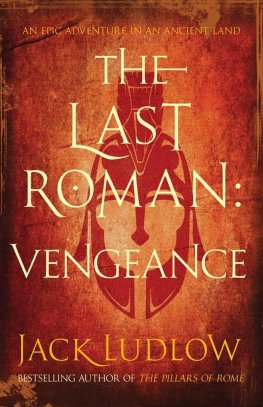Jack Ludlow - The Sword of Revenge
Here you can read online Jack Ludlow - The Sword of Revenge full text of the book (entire story) in english for free. Download pdf and epub, get meaning, cover and reviews about this ebook. genre: Adventure. Description of the work, (preface) as well as reviews are available. Best literature library LitArk.com created for fans of good reading and offers a wide selection of genres:
Romance novel
Science fiction
Adventure
Detective
Science
History
Home and family
Prose
Art
Politics
Computer
Non-fiction
Religion
Business
Children
Humor
Choose a favorite category and find really read worthwhile books. Enjoy immersion in the world of imagination, feel the emotions of the characters or learn something new for yourself, make an fascinating discovery.

- Book:The Sword of Revenge
- Author:
- Genre:
- Rating:5 / 5
- Favourites:Add to favourites
- Your mark:
- 100
- 1
- 2
- 3
- 4
- 5
The Sword of Revenge: summary, description and annotation
We offer to read an annotation, description, summary or preface (depends on what the author of the book "The Sword of Revenge" wrote himself). If you haven't found the necessary information about the book — write in the comments, we will try to find it.
The Sword of Revenge — read online for free the complete book (whole text) full work
Below is the text of the book, divided by pages. System saving the place of the last page read, allows you to conveniently read the book "The Sword of Revenge" online for free, without having to search again every time where you left off. Put a bookmark, and you can go to the page where you finished reading at any time.
Font size:
Interval:
Bookmark:
Jack Ludlow
The Sword of Revenge
PROLOGUE
The dedication of a tomb to a great man was a magnificent occasion, doubly so when the person whose life was being recalled was someone seen as honest, upright and a friend to the common people. Few doubted that the individual being honoured this day had been such a man; if he had demonstrable defects they were those of the ordinary mortal: however upright a man tried to be in his life, he could never quite stand unbowed against the malice or jesting nature of the Gods.
Born into one of the leading families of Rome, Aulus Cornelius had been a great general, the man who led the legions against, and humbled the heirs of, Alexander the Great. His victories in Greece had earned him the suffix Macedonicus and wealth beyond the dreams of avarice, but it was not just his fighting qualities that singled him out. He was remembered as an administrator who had employed, both in Rome and in the provinces, a light touch in the magistracies he had occupied, including the two occasions on which he had held the office of Consul, never bearing down on the poor and dispossessed in favour of the rich, the well-born or the powerful.
There were many ex-soldiers resident in the city who could recollect serving under him and recall his ease of manner, his natural nobility, as well as his concern for their welfare. Not that Aulus Cornelius was soft; any legions he commanded were a byword for their tight discipline and good order. But most telling, he was loved by his comrades because he had that commodity esteemed by all fighting men: he was successful. To crown a glittering career Aulus Cornelius Macedonicus had left behind him an inspiring tale to make the whole population of the city of Rome feel proud. He had died a heros death in the province of Illyricum, leading a mere seventy men who perished with him, to hold back, in a narrow defile, a much more numerous enemy, so that the legions to their rear could prepare for battle, a contest in which they were victorious.
Is that what they are saying? asked Titus Cornelius, the dead mans youngest son, who had arrived from Spain the day before. That he and his soldiers died to give the 10th legion time to prepare. That it was a deliberate sacrifice?
It is what is being put about by the man who betrayed him, as well as his friends.
Claudia Cornelia, widow of Aulus and stepmother to Titus, spoke softly, not being sure who was within earshot. Quintus, her other stepson, was preparing for the ceremonies, seemingly unconcerned that such falsehoods regarding his fathers death were being openly peddled around the city.
And does this lie go unchallenged?
Claudia smiled ruefully. The supporters of Vegetius Flaminus have paid people to go to the baths, streets, markets and taverns to spread this tale. And it is clever, Titus, for it does not diminish your father. If anything it makes him more of a paragon and that goes for the soldiers with him. They are seen as dying like Leonidas and his Spartans, knowingly giving up their lives for the greater good. What could be more puissant to a Roman soldier than to be likened to the heroes of Thermopyle?
Then its time to counter it.
Titus had been told the truth in the despatch which fetched him back from his military duties; how Vegetius Flaminus, the corrupt and corpulent governor of Illyricum, had, through his rapacity, caused an uprising amongst the locals and through his ineptitude had allowed them to combine with Dacian tribesmen from beyond the borders of the province to create a full-blown revolt. Aulus Cornelius had headed a senatorial commission to investigate Vegetius and his gubernatorial record. On seeing the depth of his fellow-senators depredations rapacious taxation, open bribery and fiscal chicanery as well as the way his army, more accustomed to labouring than soldiering, had ceased to be effective, he had superseded him.
The legion in Illyricum, the 10th, Aulus had brought back to fighting capacity by good training and personal example, till a rebellion that had festered for years seemed to peter out. No sooner had Illyricum been made peaceful, than yet another revolt started to the south, in the neighbouring Roman province of Epirus, one which the 10th Legion, the nearest large military force, was obliged to suppress. At the head of an advanced guard and seeking to contain what he thought was a local uprising, Aulus Cornelius had discovered the truth of what he faced, an enemy army large enough to give full battle. He sent back for reinforcements but Vegetius Flaminus had declined to throw them forward, leaving Aulus isolated with his reconnaissance cohort at a narrow gorge called the Pass of Thralaxas, forced to fight and take casualties before he was truly ready.
Had he and his men been supported, as they should have been, their situation would not have been grave, but by his actions the titular governor had condemned to death those who could not flee. Even when it was clear that no help was coming Aulus could have left the danger with a clear conscience it was no part of a Roman generals duties to be cut off from his command but, typically, he would not abandon the men he had led into this death-trap to save his own skin.
The rest of the commission
Claudia interrupted Titus. Lily-livered apologists for Vegetius Flaminus, or nonentities who would dearly love to bask in the reflected glory of his forthcoming triumph. Your father was the only upright man on the commission he led. The rest are wolves like Vegetius, or sheep too frightened to bleat the truth.
As they talked the steady hum of the crowd, gathering in the pre-dawn darkness outside the house, had grown, with the odd shout from an impatient mourner penetrating the walls. Some of those gathered would have been drinking and have joined the spectators in the hope that the new head of the Cornelii family would chuck some coinage at their feet: it was the way of the funeral rites of the wealthy, which were as much a celebration of a life lived as a grieving over loss. A slave appeared to inform them that Quintus was ready to begin, with prayers to Manes, the God of deceased loved ones, at the family altar. Titus and Claudia pulled cowls over their heads, then made their way to the small chapel off the atrium, home to the Cornelii Lares, the repository of the family Genius.
The overseer nearly got Aquila. In place before dawn, Nicos had changed his tactics, staying still and waiting for the poacher to appear in the deepest part of the wood, rather than trying to track him as he hunted, snaring the small game and spearing the larger, stealing what was not rightfully his from the fenced-off land belonging to Cassius Barbinus. He and the men he led made sure they were downwind of their quarry, so that when the boy stopped well short of the first of his traps, he was not sure why. It was the lack of noise in a place that should not be silent: such a thing signified a threat. Remaining still, he saw no birds fly nor land in the trees and a search of the morning sky showed no hawks or kestrels, not even a high-flying eagle. If no birds sang in the woods, nor were staying still for fear of a flying hunter, that meant there was something else present, something large enough to command a hush.
Slowly and silently he backed away, watching with care where he placed his sandalled feet on a forest floor thick with leaves, twigs and broken-off branches. If it was a large predator that had made the forest still he had no desire to confront it; if it was human the chances of that being friendly were small. Aquila knew just how angry the Barbinus overseer was at his poaching, because Nicos had told everyone in the district that he knew what was going on and just what he intended to do with a whip when he caught the culprit.
The awareness he had of this wooded world had not deserted Aquila following the events of four seasons past; it could hardly be otherwise with Minca his constant companion. The huge dog was lying still, hardly breathing while Aquila checked his traps, but he stood as his master backed towards him, pointed ears pricked as he sensed danger, soundlessly on Aquilas heels as the boy passed him. Soon they were out in an open field, playing as a boy and dog should, engaged in a tug of war over a thick stick, as the sun rose over the mountains to the east to light the fields of pasture and the quietly grazing cattle.
Font size:
Interval:
Bookmark:
Similar books «The Sword of Revenge»
Look at similar books to The Sword of Revenge. We have selected literature similar in name and meaning in the hope of providing readers with more options to find new, interesting, not yet read works.
Discussion, reviews of the book The Sword of Revenge and just readers' own opinions. Leave your comments, write what you think about the work, its meaning or the main characters. Specify what exactly you liked and what you didn't like, and why you think so.





